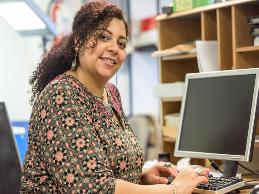My career spans more than 30 years in the field of disability and employment. As expected, many changes have occurred as we march toward that more inclusive workplace. Noticeably over the past few years, a number of younger conference speakers and training participants are echoing these changes.
One of these new leaders is Claire Stanley, the Advocacy and Outreach Specialist for the American Council of the Blind. In this blog, Claire and I present perspectives from the Old School – we who have been working in this field for decades – and the New School – younger people in the field who have a greater sense of empowerment and push for more transparency.
Claire and I have found these differences in number of areas. Below we present our time bound perspectives.
The Language of Workplace Inclusion -
Old School, Lou Orslene:
We speak and advocate for “people first” language. We feel using “people” before the disability conveys the commonalities of being people first and that disability is just one element of our humanity. Over the years, this approach to language has been included in disability etiquette trainings and adapted by many employers. However, even those who have been in the field for decades recognize that the disability community is not monolithic in their thinking and recognize that some communities reject “people first” language. Examples of this include the deaf community and the autism community. While using and advocating for “people first” language, we also resist the language of “differently abled” or “challenged,” but understand it persists in many companies and media outlets. Along with “people first” language, many in my generation refer to the younger generation of people with disabilities as the “ADA Generation.” My preference, however, when referring to young people with disabilities is “individuals who have benefitted from IDEA (Individuals with Disabilities Education Act).”
New School, Claire Stanley:
People first language is falling into disuse. The idea once was that a person should be identified before his or her disability. However, disabled persons are now speaking out and wanting their disability to be acknowledged as a part of who they are. This can be compared to ethnicity or gender. As a woman, I am proud to be a woman. One would not state that Claire is an individual who happens to be a woman. No, I am a woman. I have spoken with members of multiple races and minority ethnic groups who feel the same way. The verdict is in; color blindness does not work. We should embrace the many facets of who we are, not make them characteristics we might talk about later. This new practice is known as identity language. Disability is part of my identity. I am a blind woman.
Furthermore, the label of the ADA Generation is full of all kinds of negative undertones. Yes, I am from what has become known as the ADA Generation. I was born in 1988, just two years before the passage of the Americans with Disabilities Act (ADA). As a result, I know no else. And as a result, I am extremely privileged. But I do not take that for granted. It is perceived in some circles that my generation takes the law for granted. However, our generation does just the opposite. We feel unbelievably fortunate and as a result, we will continue to fight the fight the great leaders fought before us. But it can be frustrating when older advocates view us as a generation who selfishly forget the amazing work that came before us. I will not forget the tireless work that came before me.
Identifying as Disabled -
Old School, Lou Orslene:
Identifying as disabled typically occurs when individuals with disabilities choose to exercise their rights under the Americans with Disabilities Act (ADA). In the workplace, identifying as a person with a disability - disclosing - is necessary to a request an accommodation. There are two drivers at work here - one legal and one social. First, disclosure of a disability is seen as a trigger for initiating the interactive process under the ADA. Internally, from recruiters to supervisors to more recently diversity and inclusion professionals, employer representatives are trained to listen for the language of disability, medical condition, and chronic health condition in order to begin engaging with the employee about potential accommodations. We in the field were trained and have trained others that under the ADA, the Equal Employment Opportunity Commission (EEOC) requires no specialized terminology in order to request an accommodation. So it is imperative that employer representatives listen carefully for language that might infer a ADA-covered disability. The social driver for not identifying as disabled stems from a long history of stigmatizing people who have disabilities. This stigmatization has led to the fear of discrimination and therefore discouraged many people from identifying. In light of this history, when I have provided training on disability etiquette in the workplace, I have often suggested that disability is not a topic to be discussed in the workplace. Further, I would suggest that disability is a confidential matter to only be discussed on an as need to know basis with those responsible for providing an accommodation or if the employee with a disability agrees to share information.
New School, Claire Stanley:
I’m not naïve enough to think that all stigma has dissipated. Disclosing a disability in the workplace is still something people fear, and when I educate people on their rights under the ADA, I remind them that they both have the right to choose if they want to disclose and that only HR has the right to know. Americans should always be aware of their rights under the ADA.
However, in spite of that, I still encourage people to be more bold to disclose their disability if appropriate. In fact, more people than we think would benefit from reasonable accommodations in the workplace. If we are willing to disclose to one another, perhaps more people will be emboldened to speak out and request reasonable accommodations. This would enhance the productivity of all work environments. Instead of fostering a culture that encourages disabled employees to live in fear of disclosing their disability, we should work to foster a new culture of openness. This is the only way things will change. But again, I am not naïve; I know it is a difficult and big undertaking.
Disclosure –
Old School, Lou Orslene:
Corporate lawyers along with their interpretations of the requirements of the ADA drive this process. Lawyers advise supervisors/human resource staff not to ask about the need for an accommodation fearing the employee with a disability could consider this discrimination under the “regarded as” prong of the ADA. The only circumstance in which this is appropriate is in situations where the need for accommodation is very obvious,such as when a person who uses a wheelchair is not able to access the restroom. Again because of the possibility of discrimination, we caution the applicant/employee with a disability about disclosing and suggest they weigh the “pros and cons” of disclosure very carefully.
New School, Claire Stanley:
Again, persons should always weigh the pros and cons. This is something all persons should explore before jumping into a new employment situation. However, I believe it is important to empower employees, or potential employees, by stressing the possibilities that are opened up when someone does ask for reasonable accommodations. Yes, it is nerve wracking to ask for accommodations; one does not know how the employer will react. However, one does not need to ask for the accommodation until after the job is secured. In fact, one will far better show his or her talents, skills, and abilities if, with the necessary accommodations, they demonstrate how capable they are when performing their job. Furthermore, this works as a way to show how other potential future disabled employees can also do the job; that employee is paving the way for future disabled workers. Instead of being obtuse about the situation, let’s rip off the bandage and show that disabled employees are capable.
Workplace Accommodations –
Old School, Lou Orslene:
Requesting workplace accommodations happens when a person with a disability recognizes a workplace barrier that can be overcome by a change or adjustment at work. Requesting accommodations can occur anytime during the employee life cycle. However, one of most important points I share with people is that request for accommodation should be made prior to any performance management meeting. While understanding past stigmatization/discrimination may have occurred when previously requesting accommodations, waiting until a performance meeting to disclose the need for an accommodation may not be the best approach. A request coming at this time may be suspicious to your manager. The result may be that managers, often due to a lack of appropriate training, may then mismanage what they need to do in this type of situation.
During the accommodation process, I have noticed and shared with others the distinction between a young person with a disability who benefited from IDEA/ADA and a “baby boomer.” A young person may be empowered and proud of their disability. They may have considerable knowledge about what accommodations work for them resulting from years of individual education plans and assessments, and may be more open to sharing this with an employer. On the other hand, a more senior employee with an acquired disability may not have much knowledge of their disability or chronic health condition. For instance, a 54 year old woman who is newly diagnosed with Multiple Sclerosis (MS) may not understand the limitations of her disability, may not know anyone else who has MS, may not know of any accommodations that would help, and may be initially trying to figure out how she and her family will survive financially. Thus, the interactive accommodation process is very situational, not only in terms of the disability or chronic health condition; it also differs greatly whether the disability is acquired or if the person has had the disability since early in life.
New School, Claire Stanley:
I completely agree that a huge difference exists between those who grew up with their disability versus those who develop the disability later in life. The perspective and understanding of the disabilities are so different. As someone who grew up with my disability, when asked what job accommodation I would need, for the most part, I had an answer. This is less likely for someone who is older who just developed the disability. I wish I had a magical answer to better equip those who develop their disability later in life; it is something that should be further discussed.
Targeting Corporations for Employment -
Old School, Lou Orslene:
I always suggest that young people with disabilities start their job search by targeting employers known for being disability inclusive. Thus, one should target companies who are members of Disability:IN, the National Disability and Business Council, the Disability Management Employer Coalition, the American Association for Access, Equity, and Diversity, or who support the American Association of People with Disabilities. Another strategy is to target companies on Diversity Inc’s list of top ten companies for being disability inclusive. I also suggest young people educate themselves about Schedule A in gaining employment within the Federal government.
New School, Claire Stanley:
I understand the desire to find employment for disabled persons with businesses that have generally been favorable to employees with disabilities. However, with that said, it makes me angry that we have to do so. People should be able to apply and work for whatever industry they wish to as long as they are qualified for the job. In the blind community, patterns definitely emerge as to where blind persons work. This exists because some industries, employers, etc., are more likely to hire blind employees. I get this; it is the reality of things. But that does not mean it does not bother me. If I go to school, get the right internships, etc., I should be able to work wherever I want. And when we continue to pigeon-hole disabled employees into such jobs, I believe we are doing a disservice. Now, I’m not naïve. I know when a person needs a job to pay the bills, they are going to take it. It is the reality of things. But in the meantime, things need to shift to allow disabled persons to seek whatever kind of employment they want, regardless of the preexisting relationships. Things will not change if we don’t do so.
The Value Proposition for Hiring, Retaining, and Advancing People with Disabilities -
Old School, Lou Orslene:
Corporate leaders must be convinced of a strong value proposition or business case in order to support changing current processes. While I typically qualify conversations about employing people with disabilities by first saying it is a human dignity issue, I always follow-up with statistics about the low cost of accommodation, lower absentee rates, increased safety, etc. Then, I often speak of the persistence and problem solving abilities of people with disabilities. While this may leave some with the impression that people with disabilities are “superhumans,” I’ve never come up with a better way to persuade those in business to be more inclusive of people with disabilities. But, I know from colleagues who are working to make their workplace more inclusive that a hard, quantifiable business case for hiring, retaining, and advancing people with disabilities is at the request of senior leadership.
New School, Claire Stanley:
For traditional, for-profit businesses, I believe the typical arguments for economic profit will continue to speak volumes; if you hire someone with a disability, your profits will increase. Consequently, I believe this should continue to be used as an argument to hire people with disabilities.
However, alongside that, especially in different kinds of work environments including the public sector, the need for diversity should be spread as well. Diversity is a concept that is being used more and more. Studies show that the more diverse a work place is, the more profitable and successful a workplace is. Consequently, the argument for diversity that includes disabled people should be made in all of our workplaces.
I want to thank Claire for her willingness to engage in this blog regarding the changing nature of disability in the workplace and hope it is instructive for the many stakeholders vested in making all of our workplaces more inclusive of people with disabilities.










Comments